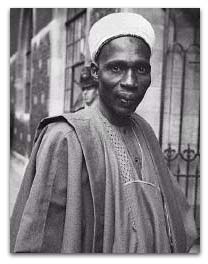

Abubakar Tafawa Balewa
|
Abubakar Tafawa Balewa In 1951, he won a seat in the House of Assembly, Kaduna and was sent to Lagos by his party where he was appointed Federal Minister of Transport and Works in 1955. It was during his tenure that the River Niger bridge at Onitsha was constructed, A fearless and courageous politician, he was a permanent delegate to the various Constitutional Conferences held in London leading to Nigeria's independence. He was Prime Minister from 1957 until January 15. 1966 when he was assassinated during Nigeria's first military coup. Abubakar was a committed Nigerian politician, leader in the Northern Peoples Congress (NPC), and the first federal prime minister. A commoner by birth, an unusual origin for a political leader in the NPC, Balewa was both a defender of northern special interests and an advocate of reform and Nigerian unity. Balewa was a teacher by profession and was one of the first Northern Nigerians to be sent to London University Institute of Education (1945). On his return in 1946 he was elected to the House of Assembly of the Northern Region and in 1947 was one of five representatives to the Central Legislative Council in Lagos. He was reelected to the assembly in 1951 despite the hostility of some conservative amirs of the generally Muslim north. From 1952 until his death Balewa served
in the federal government: he was minister of works and of transport
in the middle 1950s, and then, as leader of the NPC in the House of
Representatives, he was made the first prime minister of Nigeria. After
the preindependence elections of 1959, he again became prime minister
in a coalition government of the NPC and Nnamdi Azikiwe's National Council
of Nigeria and the Cameroons. As prime minister of independent Nigeria,
he was sharply circumscribed in his powers by those delegated to regional
premiers. He proved unable to mitigate the growing tensions of 1964-66,
manifested by a partial boycott of the election in 1964, army unrest,
and outbreaks of violence in the Western Region. He was killed in the
first of two Nigerian army coups in 1966.
<<< Previous Page | Next President >>> |
|
|
Write Your Comment
Search
Nigerian Government
The Federal Republic of Nigeria is governed in accordance with the provisions of a Constitution.In 1914 the Protectorates of Southern and Northern Nigeria were amalgamated with the Colony (Lagos) by Lord Lugard to form what is now known as Nigeria.
Nigerian Music
The music of Nigeria includes many kinds of Folk and popular music, some of which are known worldwide. Styles of folk music are related to the multitudes of ethnic groups in the country, each with their own techniques, instruments, and songs. Listen to music of Nigeria.
